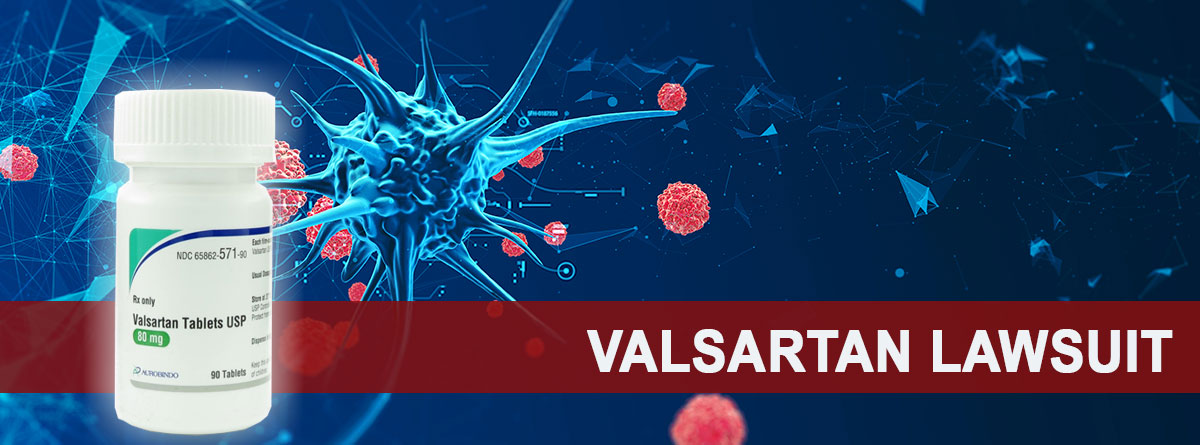Valsartan
Diovan (valsartan) was originally approved for Novartis by the FDA in 1996 to treat hypertension and blood pressure. It belongs to a class of drugs known as angiontensin II receptor blockers (ARBs), and has been widely available as generic valsartan since 2012 (generic valsartan made up 21% of all generic ARB prescriptions in 2018). Unlike many other pharmaceutical litigations we pursue, this is not a case of unwarned for side effects, instead because of the largest Class I recall ever issued by the FDA of more than 2 million pills.
In mid-2018, it was discovered that certain versions of generic valsartan and valsartan HCTZ may contain an impurity known as N-nitrosodimethylamine (NDMA), a known cancer-causing agent, due to the introduction of the agent during manufacturing. The first valsartan recalls were announced by the European Medicines Agency (EMA) in early July 2018, followed days later by the FDA, impacting several products which used active ingredients manufactured by Zhejiang Huahai Pharmaceuticals in China. Zhejiang then supplied these generic drugs containing NDMA to US-based pharmaceutical companies, Teva Pharmaceuticals, Major Pharmaceuticals, and Solco Healthcare among others, who distributed them to the US market.
NDMA
NDMA is identified as a cancer-causing agent by the U.S. Environmental Protection Agency (EPA) and other government agencies worldwide. The U.S. has legal limits on how much NDMA can be in drinking water. It has been linked to an increased risk of liver cancer and is suspected of increasing the risks of kidney cancer and lung cancer as well. EPA determined that consuming up to 96 nanograms of NDMA per day is considered reasonably safe for human ingestion. The recalled pills far exceeded that level, according to FDA investigators. Since the initial recall, a number of additional recalls of valsartan and similar drugs have been announced due to the presence of two similar impurities, n-nitrosodiethylamine (NDEA) and N-Nitroso-N-methyl-4-aminobutyric acid (NMBA).
An individual case study published in the Macedonian Journal of Medicines in early 2019 warned that valsartan side effects could be linked to an increased risk of melanoma. The particular valsartan-based drug used in this case study did not involve one of the recalled lots. This could mean that an additional cancer risk of valsartan, unrelated to the introduction of NDMA in the formulation should be explored.
Current Status Of Litigation
In February 2019 the JPML ordered all cases to be coordinated and consolidated into MDL #2875 and were transferred to the District of New Jersey to be overseen by Judge Robert B. Kugler. As of February 2024 there were more than 1,200 lawsuits filed with 28 potential bellwether cases being marked. A February 2021 ruling allowed fraud claims over cancer-causing agents to proceed against manufacturers but dismissed suits filed against distributors and pharmacies.
Update
The first bellwether trial was scheduled to being March 18, 2024, but Judge Kugler has posted a texted delay order without explanation. On March 26, 2024 Judge Kugler denied a defense motion for summary judgement, allowing for bellwether trial to move forward later this year.
Links:
- https://www.fda.gov/news-events/press-announcements/fda-announces-voluntary-recall-several-medicines-containing-valsartan-following-detection-impurity
- https://fortune.com/2018/07/16/recall-fda-valsartan-blood-pressure-medication/
- https://www.ema.europa.eu/en/news/ema-reviewing-medicines-containing-valsartan-zhejiang-huahai-following-detection-impurity-some
- https://www.epa.gov/sites/production/files/2017-10/documents/ndma_fact_sheet_update_9-15-17_508.pdf
- https://www.nytimes.com/2019/09/13/health/zantac-cancer-ndma.html
- https://www.id-press.eu/mjms/article/view/oamjms.2019.042


